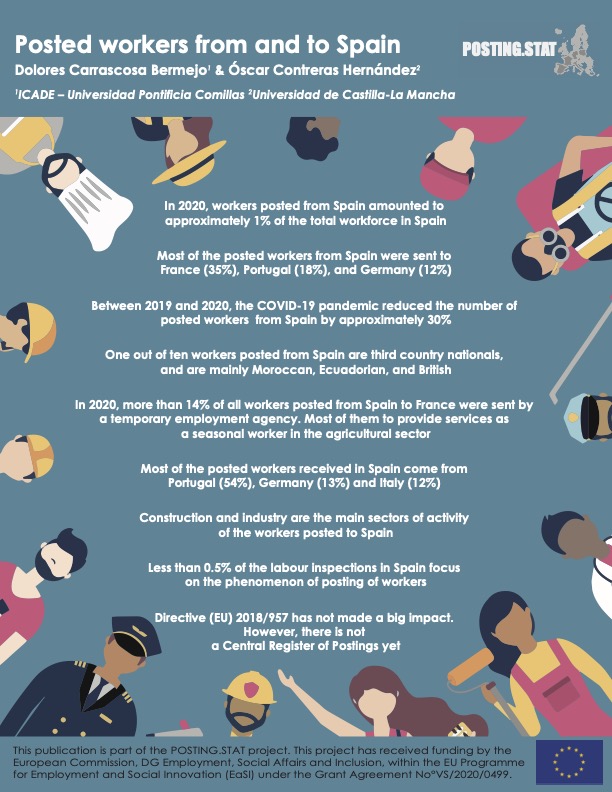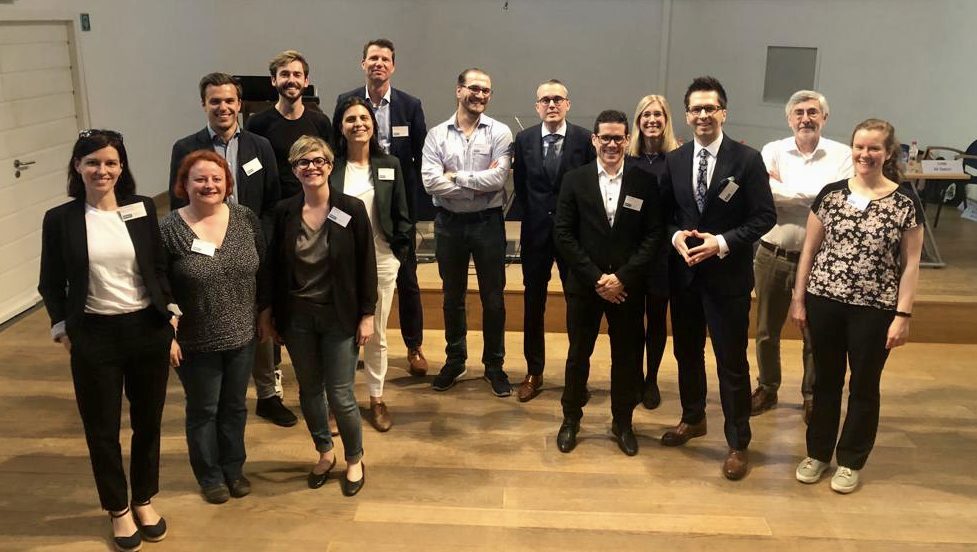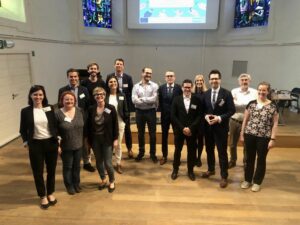
¿Cuántos trabajadores desplazados son movilizados cada año entre Estados miembros? ¿Qué sectores son realmente los protagonistas en este tipo de movilidad internacional? ¿Es posible estimar el fraude y atajarlo mediante el análisis de los metadatos existentes a escala nacional?
Estas son solo algunas de las preguntas a las que responde este proyecto europeo, que reúne a un consorcio de universidades y centros de investigación de diez Estados con el objetivo de promover una base empírica de información sobre el desplazamiento de trabajadores mediante la recopilación y el análisis de microdatos administrativos disponibles. Los partners españoles en el consorcio son la Universidad Comillas (ICADE) con la participación de la profesora Dolores Carrascosa Bermejo y la Universidad de Castilla-La Mancha, con la participación del profesor Óscar Contreras Hernández.
Los informes nacionales publicados en la web del proyecto muestran datos sobre la escala, las características y el impacto de los desplazamientos dentro de la Unión, poniendo el foco en aquellos sectores que presentan mayores dificultades de medición o mayores espacios de fraude y dumping social, como el transporte internacional por carretera, el sector agroalimentario, la construcción, el sector de los espectáculos y el sector de la industria cárnica.
Igualmente se pretender obtener información sobre el volumen y el perfil de los desplazamientos fraudulentos, focalizándose la investigación en el impacto de la pandemia y realizando una primera evaluación de la implementación y correcta aplicación de la Directiva (UE) 2018/957 que modifica la Directiva 96/71/CE relativa al desplazamiento de trabajadores en el marco de la prestación transnacional de servicios.

DISPONIBLE AQUÍ EL INFORME PAÍS (ESPAÑA) EN ESPAÑOL:
Desplazamiento intracomunitatrio de trabajadores desde y hacia España: hechos y cifras
DISPONIBLE AQUÍ RESUMEN (PRESENTACIÓN CON GRÁFICOS Y FIGURAS) RESULTADOS EN ESPAÑOL:
Principales resultados informe español (gráficos y figuras)
DISPONIBLE AQUÍ EL INFORME PAÍS (ESPAÑA) EN INGLÉS:
Posted workers from and to Spain. Facts and figures
POSTING.STAT – ENHANCING THE COLLECTION AND ANALYSIS OF NATIONAL DATA ON INTRA-EU POSTING
POSTING.STAT brings together a consortium of universities and research centres from 10 different Member States to promote the evidence basis through the collection and analysis of national micro-data. The geographical scope of the project covers the six main ‘sending’ Member States (Germany, Poland, Italy, Spain, Slovenia and Luxembourg) and the six main ‘receiving’ Member States (Germany, France, Belgium, Austria, the Netherlands and Luxembourg) of posted workers. Extracting administrative micro-data from the competent public authorities, complemented by desk research as well as by expert interviews, should result in more accurate figures on the scale, characteristics and impact of intra-EU posting, both in the main receiving and sending Member States.
Main research topics:
The scale, characteristics and impact of intra-EU posting;
The scale and characteristics of irregular intra-EU posting;
The impact of the COVID-19 pandemic on intra-EU posting;
The impact of Directive 2018/957/EU amending Directive 96/71/EC.
Project output and news
Project coordinators:
Frederic De Wispelaere: frederic.dewispelaere@kuleuven.be
Em. Prof. Jozef Pacolet: jozef.pacolet@kuleuven.be
Project partners
COMILLAS – Comillas Pontifical University (Spain)
CUE – Cracow University of Economics (Poland)
ELMI – European Labour Mobility Institute (Poland)
European Centre for Social Welfare Policy and Research (Austria)
ifo Institut – Leibniz Institute for Economic Research at the University of Munich (Germany)
LISER – Luxembourg Institute of Socio-Economic Research (Luxembourg)
PSE – Paris School of Economics (France)
SEO – SEO Amsterdam Economics (The Netherlands)
UCLM – University of Castilla-La Mancha (Spain)
UNIMI – University of Milan (Italy)
UNISTRA – University of Strasbourg (France)
ZRC SAZU – Research Centre of the Slovenian Academy of Sciences and Arts (Slovenia)
Associate organisations
CEEMET – Council of European Employers of the Metal, Engineering and Technology-based industries
EFBWW – European Federation of Building and Woodworkers
ESIP – European Social Insurance Platform
EUROFEDOP – European Federation of Employees in Public Services
Other references
This project has received funding by the European Commission, DG Employment, Social Affairs and Inclusion, within the EU Programme for Employment and Social Innovation (EaSI) under the Grant Agreement Number VS/2020/0499.



